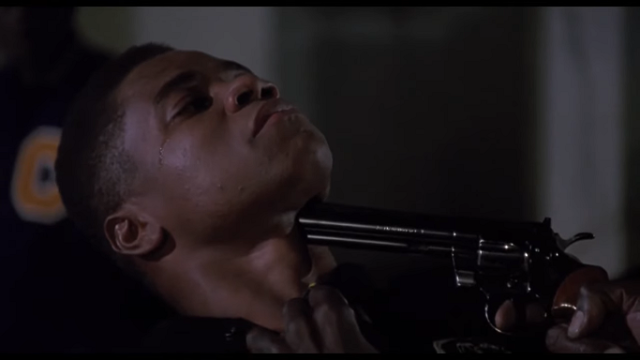Back when Moonlight came out, many critics described it as a universal story filtered through the specific experiences of a gay black man, and one minor response I saw was outrage at this idea. I’m characterising this from memory, but if I remember rightly, the gist of their frustration was that white and straight critics would take ownership of a story about a queer black man; this is not universal because there are experiences and feelings and ideas that belong solely to queer black men. This was floating through my head as I watched Boyz N The Hood. I saw resonance with my own experiences, feelings, and even favourite movies. Like Tre, I grew up in a suburban area where people were expected to pursue higher education, play sports, and enjoy barbeques on the weekend in which there were rigid rules of etiquette that were rarely actually fully respected. Like Furious, I frequently find myself exasperated with people who prioritise revenge and personal face over a bigger picture than themselves, who perpetuate cycles of violence (rhetorical and otherwise) because they can’t just let go of shit. And the superficial structure of the film reminds me strongly of the films of Jim Jarmusch, seeming to be plotless until details explode in the final third of the film in unexpected ways.
Of course, all of these things are coated in the African-American experience of Central Los Angeles, 1991. Writer/director John Singleton presents this as a classic crabs-in-a-bucket situation, where attempts to escape are thwarted by your fellow oppressed as much as the people trying to keep you there. In a deeply romantic film, Tre is presented with an idealised childhood; his parents are separated, but his father is shown as superhumanly good and paternal, deeply concerned with both educating his son and making him feel loved. In a crucial moment at the climax of the film, this is enough to keep Tre from going out and avenging Ricky, whereas Doughboy has no such person to anchor him and commits a brutal murder that will get him killed offscreen. It was not enough to prevent the murder of Ricky in the first place.
Does the fact that I am neither Black nor American (and especially not from Central LA) prevent me from fully understanding this film? Clearly, I intellectually understand what’s going on here. I think of the scene where the Black cop practically spits racial epithets at Tre. I can see that his anger at Tre is really a multitude of things; hatred at the violence he’s seen, at the things he’d had to do to survive, maybe even at himself. I can recognise the root fear and the attack on Tre’s identity; I too have been lumped in with people I’m not a part of, had other people’s anxieties projected on me and suffered for it, and I can extrapolate from those feelings – see how they may be intensified and see how they fit into how a Black person might see the world. The ability to empathise forms the core of my morality. I accept that there may be something else here I’m not seeing – something magical, perhaps – and I wonder what it is.


